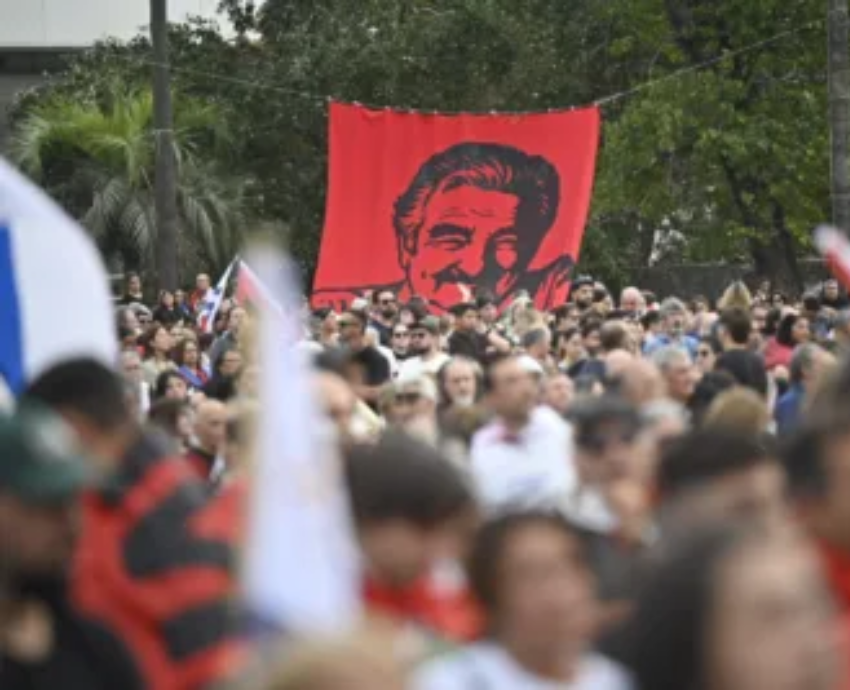
José (Pepe) Mujica, the leftist guerrilla fighter who later became president of Uruguay, died of cancer on May 13 at the age of 89. He was a symbol at first of the revolutionary armed struggle against the United States-backed military dictatorships that dominated Latin America for many decades, and then of the continent’s broad progressive political movement of the past 25 years or so.
Mujica joined the underground guerrilla movement, the National Liberation Movement — Tupamaros (MLN-T), in the 1960s, and was actively involved in its operations against the dictatorship of the time. Formed in the early 1960s, the MLN-T sought to create a revolutionary state through armed struggle, taking inspiration from the Cuban Revolution led by Fidel Castro. An estimated 300 Tupamaros died in action or in prison. Another 3000 were imprisoned.
“The Pacheco Areco government stepped up repression against leftist groups, and this intensified the work of the Tupamaros. In a skirmish with the forces of law and order, Mujica was shot six times. After several guerrilla operations, Pepe Mujica was arrested on four occasions, two of which resulted in escapes that became famous not only in Uruguay but throughout the continent for their preparation, ingenuity and organisation,” Peoples Dispatch reported on May 15.
Mujica was imprisoned again and spent 13 years in jail between 1972–85, where he had to endure torture and other abuses. The dictatorship declared him a “hostage” and threatened the guerrilla movement that if they resumed their armed actions, their leaders would be executed, reported Peoples Dispatch.
After the return to parliamentary democracy in Uruguay in 1985, Mujica was freed and eventually joined the Movement of Popular Participation (MPP), and became part of the Frente Amplio (Broad Front), an alliance of left, centre-left and even centre-right parties, which contested several elections. Mujica was elected a deputy in 1994 and was appointed president of the Senate in 1999.
In 2005, Frente Amplio won the presidency under Tabaré Vázquez, who decided that Mujica — who by then was one of the Frente Amplio’s most important leaders — would become Secretary of Agriculture, Livestock and Fisheries. “It was during this period that his ability to communicate in a clear, simple, and at the same time, a profound way, gained importance in Uruguayan politics. Mujica became an enormously charismatic character,” Peoples Dispatch noted.
These and other political qualities, such as showing himself as a unifying and mediating subject in the Frente Amplio and between the government of Uruguay and Argentina, paved his way toward becoming a presidential candidate in November 2009. After the first electoral round, Mujica defeated Luis Alberto Lacalle, with about 52% of the vote. He was sworn in as president on March 1, 2010, in a public square, together with his supporters, according to his wishes.
“Soon, images of the life of Mujica and his wife, the important Uruguayan politician Lucia Topolansky, spread around the world. They rejected the luxuries offered by the presidential office. They continued to live in a humble house in the countryside with their animals, while driving an aging Volkswagen to the presidential office to work.
Journalists and filmmakers became interested in Mujica’s story and his humility, and conducted interviews and made documentaries about him.
Mujica’s government was characterised by a rise in public spending and a fall in poverty — from 13% to 7%. The minimum wage rose by 250% and the government offered housing to families who did not have a home. Mujica donated 87% of his salary to a public fund.
Mujica supported the expansion of reproductive rights and marriage as a civil union between people regardless of their sex. His proposal to legalise the consumption of marijuana for recreational purposes was controversial. Mujica argued that this measure sought to eliminate the power of drug trafficking: “What scares me is drug trafficking, not drugs. And by repressive means, it is a lost war: it is being lost everywhere.”
He was also one of the main promoters of the state’s recognition of the persecution, torture and murder of dozens of left-wing party militants during the 20th century, especially during the 1973–85 military dictatorship. He promoted and strengthened the recovery of historical memory, which today has become an important public policy.
Mujica opposed Israeli oppression against Palestinians and his government recognised the Palestinian state in 2011. In 2014, Uruguay announced it would join Ecuador, Argentina, Brazil, Chile, Peru and Venezuela, in opening an embassy in Palestine.
In a letter welcoming the opening of the embassy, the Palestinian Authority expressed appreciation for the continued support of Uruguay in “the just and legitimate struggle of the Palestinian people to recover their inalienable rights”. Mujica said at the time that to “bombard hospitals, young and old, is genocide”.
While Mujica remained committed to policies promoting the poor and oppressed in Uruguay and Latin America, he moved away from his revolutionary views toward a more social-democratic approach, similar to President Lula da Silva in neighbouring Brazil. Mujica at one stage compared Uruguay to Finland, providing for “the people who have the least” under a diversified economy that creates well-paid jobs
Under his leadership, Uruguay declined to join the anti-imperialist political and trading bloc established by Venezuela and Cuba, the Bolivarian Alliance for the Peoples of Americas.
When he ended his five-year presidential term on March 1, 2015, Mujica said: “I’m not leaving, I’m arriving. I will go with my last breath, and wherever I am, I will be there for you, I will be with you, because that is the highest way to be with life. Thank you, beloved people.”
After Mujica died, about 100,000 people gathered to farewell him in Montevideo over two days. People lined the streets applauding him as his coffin passed by, and then paid homage as he lay in state in the Legislative Palace.
Vale Pepe Mujica, “the poorest president in the world”.